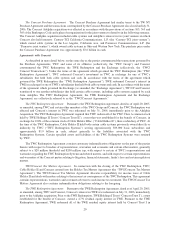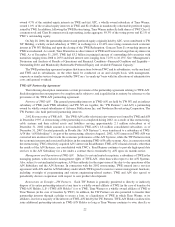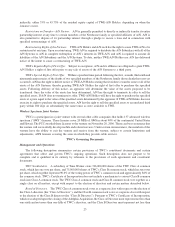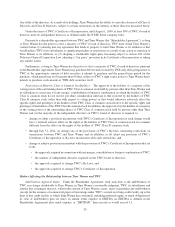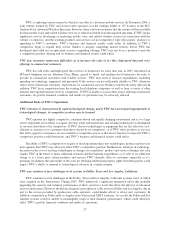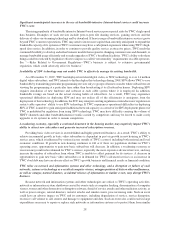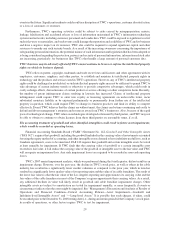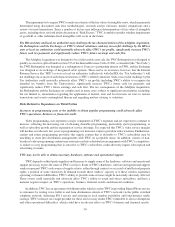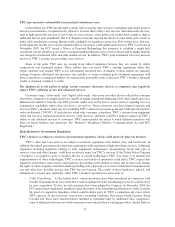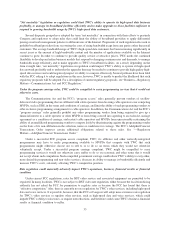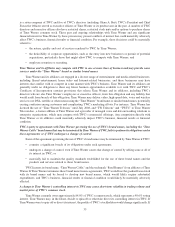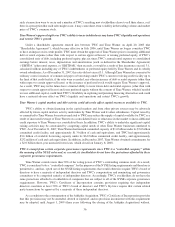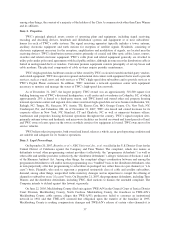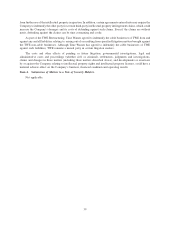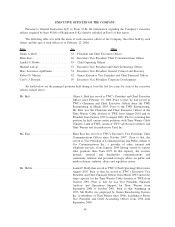Time Warner Cable 2007 Annual Report Download - page 35
Download and view the complete annual report
Please find page 35 of the 2007 Time Warner Cable annual report below. You can navigate through the pages in the report by either clicking on the pages listed below, or by using the keyword search tool below to find specific information within the annual report.The impairment tests require TWC to make an estimate of the fair value of intangible assets, which is primarily
determined using discounted cash flow methodologies, research analyst estimates, market comparisons and a
review of recent transactions. Since a number of factors may influence determinations of fair value of intangible
assets, including those set forth in this discussion of “Risk Factors,” TWC is unable to predict whether impairments
of goodwill or other indefinite-lived intangibles will occur in the future.
The IRS and state and local tax authorities may challenge the tax characterizations of the Adelphia Acquisition,
the Redemptions and the Exchange, or TWC’s related valuations, and any successful challenge by the IRS or
state or local tax authorities could materially adversely affect TWC’s tax profile, significantly increase TWC’s
future cash tax payments and significantly reduce TWC’s future earnings and cash flow.
The Adelphia Acquisition was designed to be a fully taxable asset sale, the TWC Redemption was designed to
qualify as a tax-free split-off under section 355 of the Internal Revenue Code of 1986, as amended (the “Tax Code”),
the TWE Redemption was designed as a redemption of Comcast’s partnership interest in TWE, and the Exchange
was designed as an exchange of designated cable systems. There can be no assurance, however, that the Internal
Revenue Service (the “IRS”) or state or local tax authorities (collectively with the IRS, the “Tax Authorities”) will
not challenge one or more of such characterizations or TWC’s related valuations. Such a successful challenge by the
Tax Authorities could materially adversely affect TWC’s tax profile (including TWC’s ability to recognize the
intended tax benefits from the Transactions), significantly increase TWC’s future cash tax payments and
significantly reduce TWC’s future earnings and cash flow. The tax consequences of the Adelphia Acquisition,
the Redemptions and the Exchange are complex and, in many cases, subject to significant uncertainties, including,
but not limited to, uncertainties regarding the application of federal, state and local income tax laws to various
transactions and events contemplated therein and regarding matters relating to valuation.
Risks Related to Dependence on Third Parties
Increases in programming costs or the inability to obtain popular programming could adversely affect
TWC’s operations, business or financial results.
Video programming costs represent a major component of TWC’s expenses and are expected to continue to
increase, reflecting the increasing cost of obtaining desirable programming, particularly sports programming, as
well as subscriber growth and the expansion of service offerings. It is expected that TWC’s video service margins
will decline over the next few years as programming cost increases outpace growth in video revenues. Furthermore,
current and future programming providers that supply content that is desirable to TWC’s subscribers may be
unwilling to enter into distribution arrangements with TWC on acceptable terms. In addition, owners of non-
broadcast video programming content may enter into exclusive distribution arrangements with TWC’s competitors.
A failure to carry programming that is attractive to TWC’s subscribers could adversely impact subscription and
advertising revenues.
TWC may not be able to obtain necessary hardware, software and operational support.
TWC depends on third party suppliers and licensors to supply some of the hardware, software and operational
support necessary to provide some of TWC’s services. Some of TWC’s hardware, software and operational support
vendors represent TWC’s sole source of supply or have, either through contract or as a result of intellectual property
rights, a position of some exclusivity. If demand exceeds these vendors’ capacity or if these vendors experience
operating or financial difficulties, TWC’s ability to provide some services might be materially adversely affected.
These events could materially and adversely affect TWC’s ability to retain and attract subscribers, and have a
material negative impact on TWC’s operations, business, financial results and financial condition.
In addition, TWC has an agreement with Sprint under which it assists TWC in providing Digital Phone service
to customers by routing voice traffic to and from destinations outside of TWC’s network via the public switched
telephone network, delivering E911 service and assisting in local number portability and long-distance traffic
carriage. TWC’s reliance on a single provider for these services may render TWC vulnerable to service disruptions
and other operational difficulties, which could have an adverse effect on TWC’s business and financial results.
30


